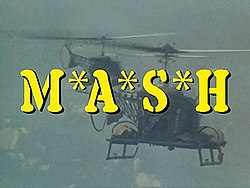M*A*S*H (TV Series)
| M*A*S*H | |
|---|---|
 |
|
| Genre | Comedy-drama |
| Created by |
Larry Gelbart Gene Reynolds |
| Based on | MASH: A Novel About Three Army Doctors by Richard Hooker |
| Starring |
Alan Alda Wayne Rogers McLean Stevenson Loretta Swit Larry Linville Gary Burghoff Mike Farrell Harry Morgan Jamie Farr William Christopher David Ogden Stiers Edward Winter Allan Arbus |
| Theme music composer | Johnny Mandel (written for the film) |
| Opening theme | "Suicide Is Painless" |
| Ending theme | "Suicide Is Painless" |
| Country of origin | United States |
| Original language(s) | English |
| No. of seasons | 11 |
| No. of episodes | 251 (list of episodes) |
| Production | |
| Location(s) | Los Angeles County, California (Century City, Malibu Creek State Park) |
| Camera setup | Single-camera |
| Running time | 24–25 minutes or 48–50 minutes (per episode) |
| Production company(s) | 20th Century Fox Television |
| Distributor | 20th Television |
| Release | |
| Original network | CBS |
| Original release | September 17, 1972 – February 28, 1983 |
| Chronology | |
| Followed by |
AfterMASH W*A*L*T*E*R |
| Related shows | Trapper John, M.D. |
| Website | |
M*A*S*H is an American television series developed by Larry Gelbart, adapted from the 1970 feature film MASH (which was itself based on the 1968 novel MASH: A Novel About Three Army Doctors, by Richard Hooker). The series, which was produced with 20th Century Fox Television for CBS, follows a team of doctors and support staff stationed at the "4077th Mobile Army Surgical Hospital" in Uijeongbu, South Korea during the Korean War. The show's title sequence features an instrumental-only version of "Suicide Is Painless", the theme song from the original film. The show was created after an attempt to film the original book's sequel, M*A*S*H Goes to Maine, failed. The television series is the best-known version of the M*A*S*H works, and one of the highest-rated shows in U.S. television history.
The series premiered in the U.S. on September 17, 1972, and ended on February 28, 1983, with the finale, showcased as a television film, titled "Goodbye, Farewell and Amen", becoming the most-watched and highest-rated single television episode in U.S. television history at the time, with a record-breaking 125 million viewers (60.2 rating and 77 share), according to the New York Times. It had struggled in its first season and was at risk of being cancelled. Season two of M*A*S*H placed it in a better time slot (airing after the popular All in the Family); the show became one of the top 10 programs of the year and stayed in the top 20 programs for the rest of its run. It is still broadcast in syndication on various television stations. The series, which depicted events occurring during a three-year military conflict, spanned 256 episodes and lasted 11 seasons. The Korean conflict lasted 1,128 days, meaning each episode of the series would have averaged almost four and a half days of real time. Many of the stories in the early seasons are based on tales told by real MASH surgeons who were interviewed by the production team. Like the movie, the series was as much an allegory about the Vietnam War (still in progress when the show began) as it was about the Korean War.
...
Wikipedia
